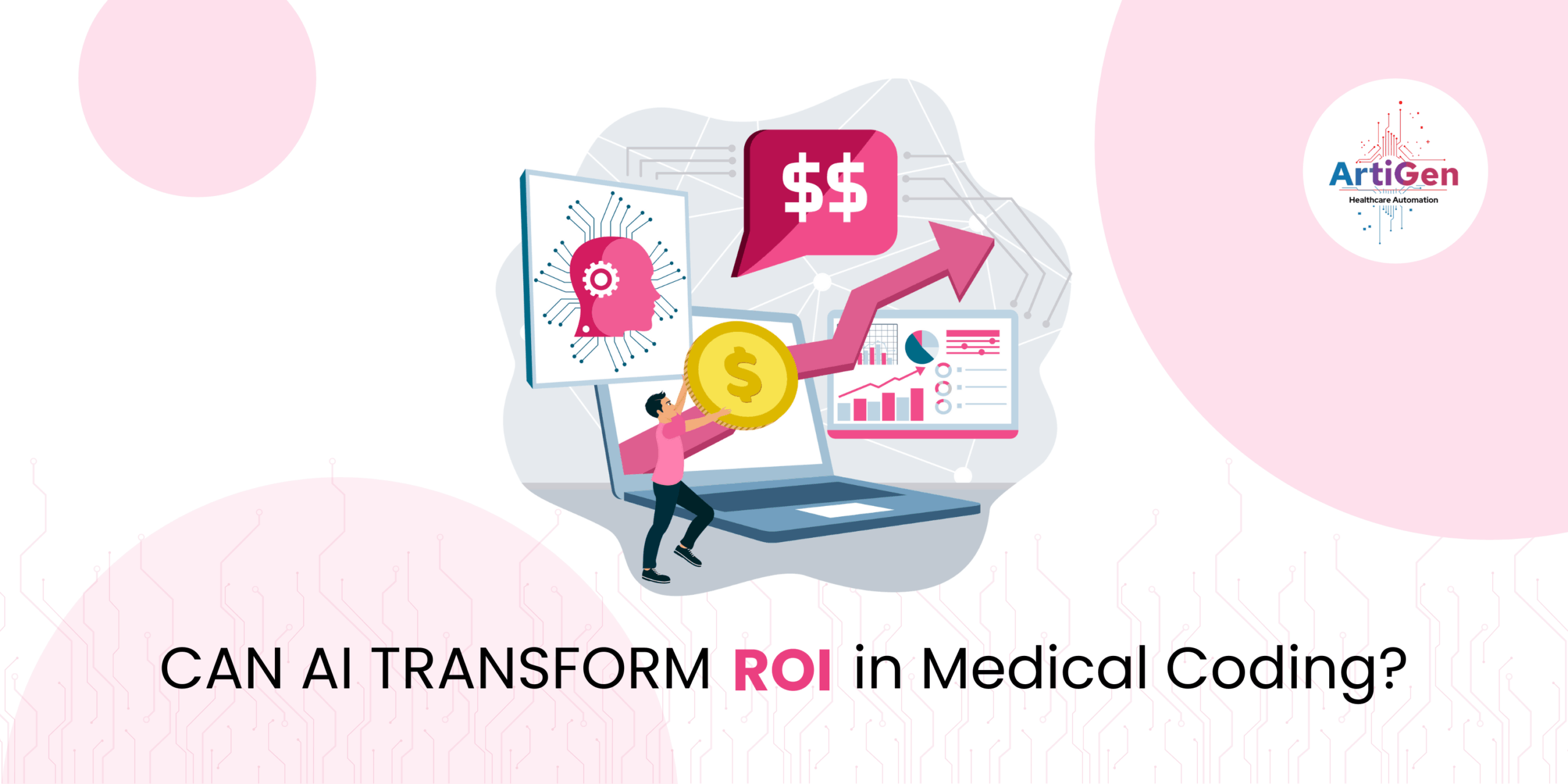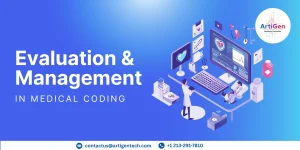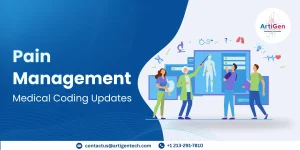

The ROI of Implementing AI in Medical Coding and Billing
In today’s fast-paced healthcare ecosystem, one of the greatest challenge for providers is balancing revenue integrity in medical coding with compliance, accuracy and efficiency. Traditional workflow will often leads to claims denials, human errors and rising admistrative costs. As an output healthcare institutions are rapidly exploring in how AI in healthcare can deliver measurable returns on investment by accelerating reimbursement, reducing cost and improving compliance.
This article will explore the ROI in AI medical coding, there impact of ai medical coding ROI on operational and financial outcomes, and how medical billing automation turns billing process into a competitive advantage.
ROI Breakdown: Why AI Matters in Coding and Billing
Providers must take into account both direct and indirect benefits when evaluating the ROI of AI in medical billing. AI solutions allow for financial resilience in a changing regulatory environment in addition to saving time.
- Direct Savings: Automating repetitive tasks reduces staffing costs and lowers the burden of manual claim edits.
- Compliance Benefits: With AI in healthcare compliance, organizations can better adhere to HIPAA, ICD-10, CPT, and payer-specific rules.
- Error Reduction: The use of AI-powered coding accuracy ensures fewer denials and higher acceptance rates for claims.
- Revenue Optimization: By ensuring revenue integrity in medical coding, AI maximizes reimbursements while avoiding under-coding or over-coding risks.
- Scalability: As patient volumes rise, automation delivers consistent accuracy and speed without increasing administrative costs.
These outcomes showcase the ROI in AI medical coding as both a financial and strategic imperative.
Technical Aspects of AI in Coding and Billing
The real strength of AI medical coding is its capacity to process, learn, and adapt clinical data in ways that are not possible with conventional software.
Natural Language Processing (NLP): enables AI systems to assign the proper codes after analyzing unstructured medical notes.
Machine Learning Models: By identifying past claim trends, detecting errors, and predicting denials, AI medical coding ROI can be continuously improved.
Automated Auditing: AI-driven audits make sure codes comply with payer policies and medical necessity, enforcing AI in healthcare compliance.
Integration with RCM: Coding, billing, payment posting, and denial management are all fully integrated into AI revenue cycle management.
By embedding artificial intelligence in healthcare billing and automated medical billing software, organizations eliminate bottlenecks, reduce dependency on manual coders, and improve bottom-line performance.
Practical Returns from AI Adoption
Instead of relying on case-specific examples, it is more useful to look at the broader outcomes healthcare organizations achieve by implementing AI in medical coding and billing. When providers embrace medical coding automation and claims processing automation, the improvements are clear—fewer denials, faster reimbursement cycles, and stronger compliance alignment.
Through a hybrid model combining medical coding automation and claims processing automation, a mid-size hospital system implemented AI in medical coding and billing. Six months later, the results were as follows:
- A 32% increase in the efficiency of healthcare coding
- 25% more efficient medical billing
- 40% fewer claims were denied as a result of AI-powered coding accuracy.
- Enhanced AI revenue cycle management leads to quicker payment cycles.
The financial impact was obvious: the return on investment ROI in ai medical coding was met in less than a year, demonstrating the viability and scalability of using AI for healthcare cost reduction with AI.
Overcoming the Compliance Challenge
Healthcare compliance is always changing. Coding and billing are very complicated due to regulations like payer-specific guidelines, ICD-10 updates, and fraud-prevention frameworks.
Conventional audits are reactive; they find problems after claims have been rejected. AI in healthcare compliance, on the other hand, makes proactive monitoring possible, guaranteeing that claims are accurate prior to submission. Providers can maintain revenue integrity in medical coding while aligning documentation with payer expectations by utilizing artificial intelligence in healthcare billing.
By lowering fines and preserving reimbursements, this proactive strategy not only improves AI medical coding ROI but also ensures compliance.
Productivity and Workforce Transformation
The impact of medical billing automation and medical coding automation on employee productivity is one of its main advantages. Coders can concentrate on complex cases requiring for human judgment rather than putting in hours reviewing the same claims.
This redistribution promotes scalability, raises morale, and increases medical billing productivity. Businesses can handle more claims with fewer mistakes when they use automated medical billing software, which directly increases the return on investment ROI in ai medical coding.
Additionally, rework is decreased through the use of claims processing automation, guaranteeing a quicker revenue cycle and steady cash flow.
The Financial Impact of AI-Powered Accuracy
Reimbursement depends strongly on accuracy. Coding mistakes increase the possibility of revenue leakage and compliance violations in addition to denials.
By comparing documentation with coding guidelines, identifying discrepancies, and suggesting fixes instantly, AI-powered coding accuracy takes care of this. Providers benefit from increased AI medical coding ROI, fewer denied claims, and higher first-pass acceptance rates as a result.
Long-term benefits include a sustained healthcare cost reduction with AI, where resources that would have been used for rework are instead allocated to patient care and expansion projects.
Future Outlook: AI as a Revenue Enabler
The next generation of AI in healthcare will go beyond automation and evolve into predictive revenue cycle management. By leveraging AI revenue cycle management, organizations will anticipate payer behavior, optimize reimbursement strategies, and adapt workflows in real-time.
With advances in artificial intelligence in healthcare billing and medical billing automation, hospitals and clinics will unlock new levels of financial resilience and efficiency. The ROI in ai medical coding will no longer be a question of “if” but “how much.”
For healthcare leaders, investing in AI in medical coding and billing is not just a cost-saving initiative but a revenue-enabling strategy that ensures long-term sustainability.
Conclusion: Partnering with the Right Technology
A strategic partner who is knowledgeable about healthcare operations and technology is necessary to implement AI medical coding and medical billing automation. That’s where ArtigenTech steps in.
At ArtigenTech, we specialize in delivering AI in healthcare solutions that combine medical coding automation, claims processing automation, and AI revenue cycle management into one seamless platform. Our focus is not just on AI-powered coding accuracy but on driving measurable outcomes—greater medical billing productivity, stronger revenue integrity in medical coding, and long-term healthcare cost reduction with AI.
Your organization can maximize the return on investment (ROI) of AI in medical coding while preserving accuracy, compliance, and operational efficiency by utilizing our knowledge in AI in medical coding and billing as well as AI in healthcare billing.






